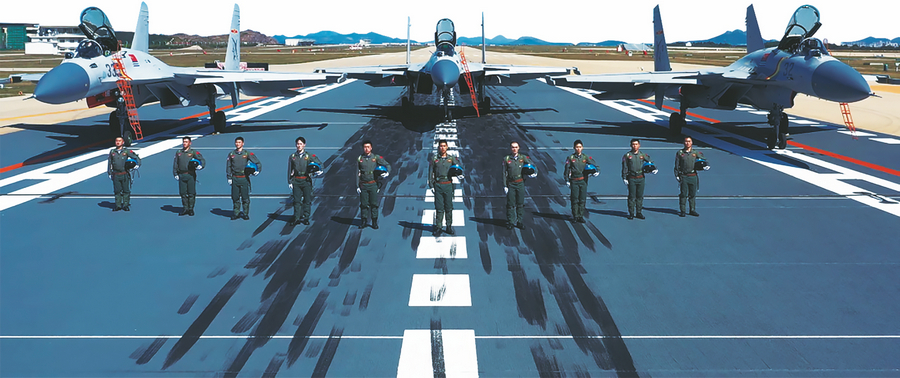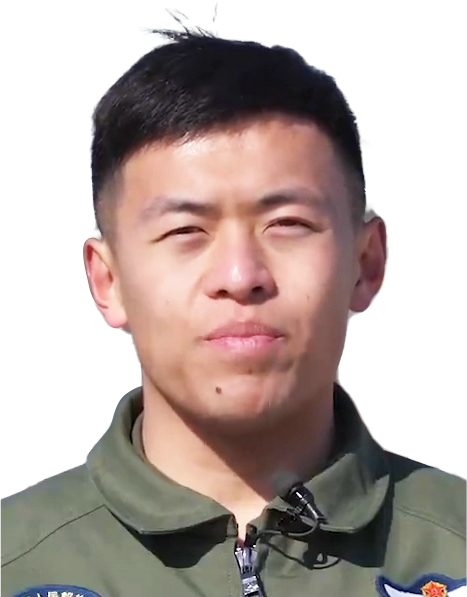
As China's carrier-based aircraft development takes flight, Zhang Yuliang shows he's got what it takes in his high-stakes career as a pilot, Wang Xingwei reports.
Since its release during this year's May Day holiday season, the Chinese movie Born to Fly has brought the work of air force test pilots into the spotlight, garnering rave reviews from both audiences and critics.
As depicted in the movie, the unexpected may occur when elite pilots soar to new heights, leading them to face extreme conditions and even rub shoulders with death to accomplish their mission. And for Zhang Yuliang, a real-life carrier-based aircraft pilot, the touch-and-go maneuvers seen in the movie are pretty much his everyday life.
"Our fighter jets are among the most agile and versatile aircraft, but of course, flying poses extreme challenges as well as risks," said the 31-year-old pilot.
Take grayout as an example. When large aircraft movements are executed, the pilot pulls high positive g-forces, leading to high pressure that can restrict blood flow to the brain. "One may experience a progressive loss of vision, with the sense of color dimmed and peripheral vision reduced. In serious cases, one may not even be able to see at all," Zhang explained.
But despite numerous challenges, Zhang has managed to overcome physical and mental limits and enjoy his high-sky moments. "I love the exhilaration of flying fighter jets, which are as swift as the wind and as quick as lightning. It's a challenge I love."
In China, the development of carrier-based aircraft — a naval aircraft designed for operations from aircraft carriers — has just begun. In order to be a qualified aircraft pilot, Zhang and his contemporaries had to undergo rigorous physical and psychological training. According to him, experienced pilots may receive refitting training where they are recruited and switched to carrier-based aircraft, and he was among the first batch of pilots to directly receive the training.
In this training process, the pilots are selected for a cadet scheme to become carrier-based aircraft pilots and are taught to fly the aircraft.
"Our carrier-based aircraft have their own specific training requirements," noted Zhang. For instance, landing can be very difficult since the aircraft carrier's runway is so short — only about 200 meters long — which is barely one-tenth of the length of a normal runway.
"Viewed from above, it's as small as a leaf. So landing on an aircraft carrier demands high-precision accuracy, with very little room for error," Zhang added.
After going through high-intensity and high-frequency training, Zhang became a top performer among the trainees, once executing nearly 100 zero-error maneuvers in 60 seconds and successfully bringing his plane back to base.
"Generally, the first pilot to take off from the carrier should have highly reliable skills and good psychological attributes. So Zhang Yuliang was chosen as the first pilot, and was expected to take up the leading role," commented Xu Can, one of Zhang's instructors.

In fact, looking back on his training days, Zhang admitted that there was a time when he was somewhat impatient.
"At one point, I felt that I wasn't making much progress while those around me were making great strides. It was really frustrating," he said.
However, as a young man always striving to be the best, Zhang took the initiative to work on his weak points.
"I'd go and do research in a library or seek out solutions from others," he recalled. "When I had a problem comprehending a concept, I was always determined not just to get the gist of it but to understand it completely."
Now having mastered advanced technical skills and being rated as someone with impressive mental sharpness, Zhang has become a flight instructor to cultivate the next generation of pilots at a training base of the People's Liberation Army Naval Aviation University in northeast China.
In Zhang's eyes, as a pilot and flight instructor, his mission is to provide the personnel with the best training. When facing these young cadets — some being born in 1996 or even later — Zhang always emphasizes the importance of having a reverence for flying, and he leads by example.
"I have to ensure my flying skills are impeccable. That's a must for me. How good you are as an instructor depends on your skills in the air," he said.
To maintain a passion for flying, teach pilots strong tactical skills, hone an indomitable fighting spirit, and possess the ability to overcome all potential threats — these are the focal points for Zhang in his work as an instructor.
"We are devoted to propelling the growth of China's naval aviation and the modernization of its national defense," he said. "And such a flying career is an invaluable asset in one's life."













